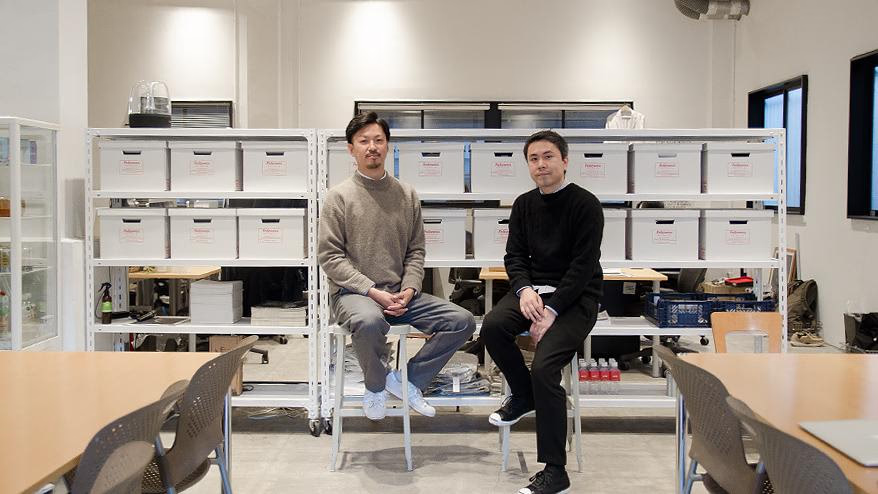2017年、今年もよろしくお願いします。セールス部の畠山です。
私たちセールス部員が「この会社こそは!」という他社様を、あたかも自社のように宣伝させていただく、「私、あなたの会社売ります!」。
第5回となる今回、登場していただくのはワヴデザイン株式会社さん。同社は、Web、印刷物、モーショングラフィックまで幅広い制作を手掛け、ニューヨークアワードなどの海外のデザインアワードや、最近ではGOOD DESIGN AWARDも受賞されるなど、賞の受賞経験も豊富なデザインスタジオです。
冒頭から私事で恐縮ですが、去年、私の仕事には大きな変化がありました。
これまでセールス部では私が新規の案件をすべて担当しておりましたが、新人の入社とともに新規のお客様の対応はほぼなくなったのです。
そこで気づいたのが、お客様との関係性の難しさ。長いお付き合いの続く関係を築き上げていくことは、新規で営業をかけるよりも大変なことだとわかりました。
そんなとき目にして、心に刺さったのが、ワヴデザインさんのサイトに書かれた「仕事は、『何をするか』と同じくらい、『誰とするか』が大切です。振り返ってみると、記憶に残る仕事は『人』で憶えていることが多いです。」という言葉でした。
長く続く関係を築くためには、お客様にとって「この人と仕事をしたい」と思われる存在にならなくてはいけない。「畠山さんは相談しやすいから」「畠山さん、なんとかなりませんか」と声掛けしていただけるお客様を増やしていきたい。そんな想いが強く芽生えています。
その点、ワヴデザインさんとの案件でご一緒するディレクターの方々はみなさん丁寧で「相談しやすく」、しっかりとした仕事で「なんとかしてくれる」人ばかり。私が売りたいワヴデザインさんの特徴は、まさに「魅力的な個の集まる集団であること」にあります。
でも、それは同時にこんな疑問にもつながります。
なぜ、ここまで魅力的な個が集まる集団になっているのだろうか?
その答えは、「働き方から、デザインする」姿勢にあるようです。
事実、ワヴデザインさんは昨年、テレビのニュース番組からの取材を受けるなど、「働き方」というキーワードで大きな注目を集めました。
代表の松本さんは「制作会社が、制作でいいものを作るのは当然だよね。それは、ごはん屋さんで食べるごはんがおいしいのと同じこと」と語り、「働き方から、デザインする」という考えで働き方そのものを変えていく会社の経営を行っています。
「また来たいと思えるお店は、店構えや接客や雰囲気、立地など、プラスαの魅力でお客さんの心を動かしている。制作会社の場合は、何がそれに当たるのか。うちは小さな会社だからこそ、一人ひとりの存在がとても大切。彼らの個を伸ばすために、働きかたそのものからを考えています」
こうして生まれたのが、「プロジェクト」と呼ばれる試みです。
「11ヶ月働いて1ヶ月休む会社」、「名刺は顔です、だからバラバラにしました」、「移動オフィス」など、さまざまなプロジェクトを立ち上げては実践し、制作物だけでなく、働き方でも既存の価値観にこだわらない姿勢を貫いています。
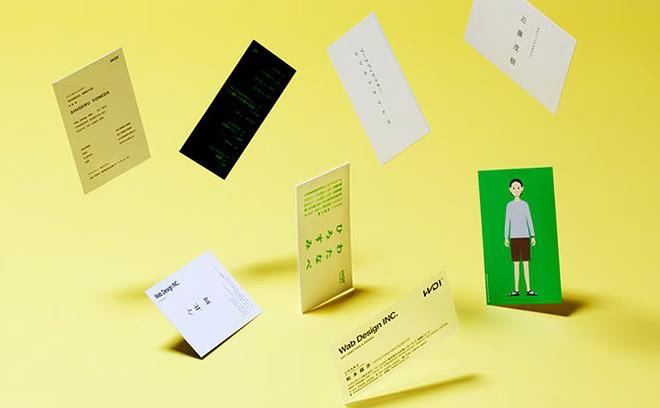
『名刺は顔です、だからバラバラにしました』プロジェクト。ひとりひとり違うコンセプトでつくられら名刺たち。
そんなふうに社員だけでなく、周囲で働く人たちもワクワクした気持ちにさせてしまうワヴデザインさんの魅力をより深く知り、広めていきたい。
そんな思いから、今回の取材をお願いしました。
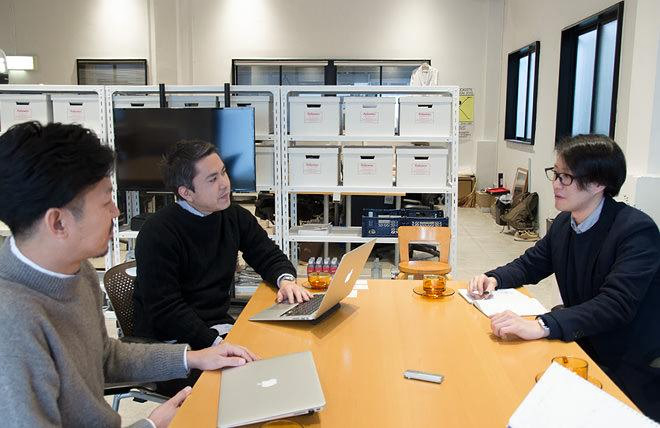
●インタビューに協力してくださった方々
-
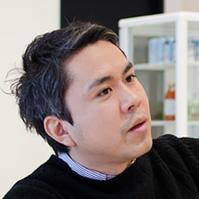
-
松本 龍彦さん
代表取締役 / アートディレクター。クリエイティブとビジネスの両立がすきなので、そのバランスを意識しながら日々働いています。2017年は去年始めたWDI Galleryにじわじわと力を入れたり、今以上に自分にしか出来ないことに力を入れていきます。
-
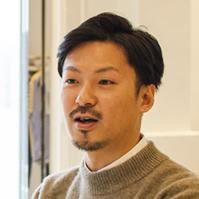
-
中村 和貴さん
取締役 / アートディレクター。喜怒哀楽問わず、感情が動くような未体験なものに触れるよう意識して刺激を受けています。今まで苦手だったところに未体験ゾーンが広がっているということに気づいてからは、足が重くなりがちですね…。超インドア派ですがキャンプは克服できそうです。
学生時代の夏休み以来の長期休暇
11ヶ月働いて1ヶ月休む会社プロジェクトとは?
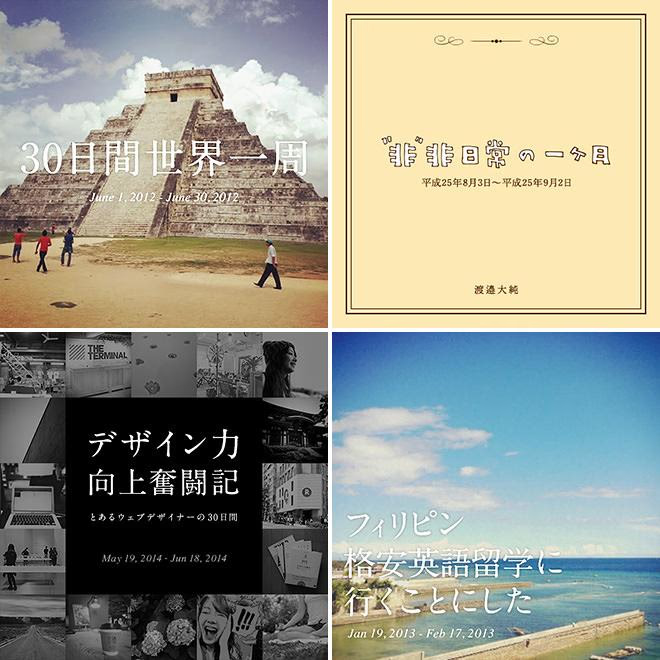
最初に質問したのは、やはり一番気になっているプロジェクト「11ヶ月働いて1ヶ月休む会社」についてです。社会人にとってめったに取ることのできない1ヶ月の連続した休み。しかも、有給休暇です。どういうキッカケから始まった試みなのでしょうか?
-
 松本さん
松本さん -
順序立てて話していくと、僕らはワヴデザインを作ったときから働き方、制作会社の仕事の仕方についていろいろ考えていたんです。業界には『デザイナーは土日も働くのが当たり前』という風潮がありますけど、中村とは『やっぱり土日働かない方がいいよね』『いっぱい働く良さもわかるけど、いっぱい休むのもいいよね』といったやりとりをしていたんですね。
それで、2012年に『11ヶ月働いて1ヶ月休む会社』というプロジェクトを始めました。当時、こういう試みをしている制作会社はありませんでしたが、せっかく自分たちで会社をやるなら、僕たちの価値観、スタイルでやりたいな、と。
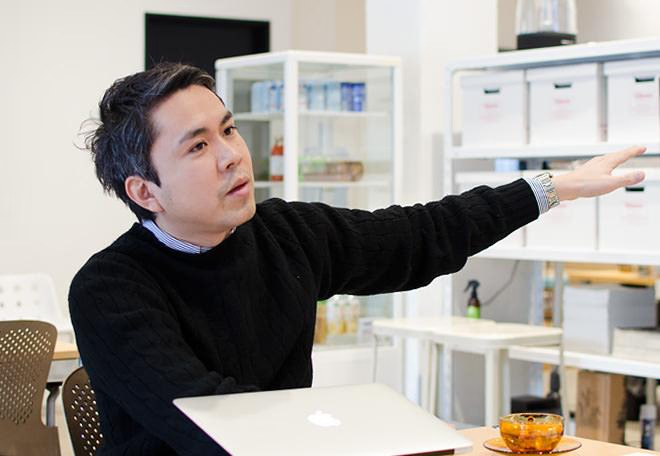
松本龍彦さん(アートディレクター・代表取締役)
-
 中村さん
中村さん -
そのとき、松本がこだわったのはプロジェクトのネーミングやどういうスタイルでやるかでした。
-
 松本さん
松本さん -
各メディアでの報道のされ方を見て、このプロジェクトを休暇制度の1つのように思う人も多いんですけど、僕らとしては福利厚生制度ではなく、制作会社が発信するクリエイティブプロジェクトというイメージでやっています。
例えば、かっこいいTシャツを作る、見た人の好奇心を刺激するプロダクトを作るというのと同じイメージなんですよ。
-
 中村さん
中村さん -
もちろん、当初は僕らの間でも『1ヶ月の休みをどうやって実現するか?』という話がよく出ました。休んでいる人の分を補う社員の数を増やす、仕事内容を単発から長期の案件にシフトしていくといった努力はしましたが、それはあくまでもプロジェクトを実現するための半分くらいの要素に過ぎません。
-
 松本さん
松本さん -
もう半分は、プロジェクトをやるかやらないかを決め、会社がOKを出し、まずは僕と中村から1ヶ月休んでしまうことでした。やりましょう、いきましょう、と。その決断がすべてだったなという気がしています。
-
 中村さん
中村さん -
最初に休んだ僕と松本は1ヶ月の休みで世界一周に出て、その後、プロジェクトを実行したスタッフは、海外での語学留学やスペインの巡礼路を歩くなど、さまざまな過ごし方をしています。
なかには、海外という非日常に対抗して非非日常をテーマに、とにかく普段やり残したようなことをやる、と言ったスタッフもいました。自宅の外壁を掃除したり、ずっと欲しかったかったピザ窯を作ってみるとか。日常に根ざした要望を叶える1ヶ月もありましたね。
いずれにしろ、そこで刺激を受け、個を磨いてくれたらいいという思いはもちろんありますし、会社の知名度が上がるといった効果もあったかもしれない。でも、始めた理由はもっとシンプルで、同じ価値観の仲間を増やしたいというところ。
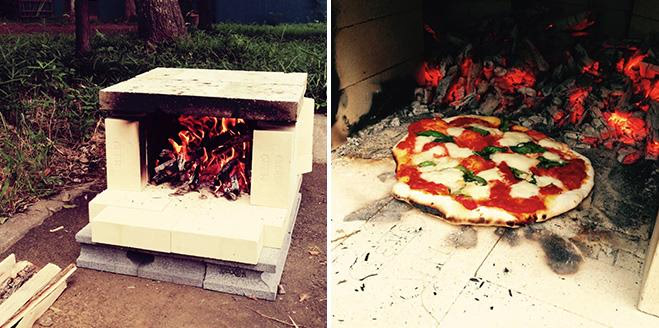
渡邉 大純(デザイナー)さんが「非非日常」として過ごした1ヶ月の休みの中のひとコマ。なんとDIYでピザ窯から作ってしまったとか。
-
 松本さん
松本さん -
モノサスさんが『ものさす』というメディアを始めるように、制作会社が増えるなかで何か新しい発信が必要ですよね。制作でいいものを作るのは、ごはん屋さんでごはんがおいしいのと同じで、当然のこと。魅力的なお店は、ごはんとは別のところで、店構え、接客、雰囲気、立地、創作料理、めったに食べられない食材……何かを発信しています。
おいしいのは当然。デザインがいいのは当然。それ以外のところで何をしているのか? が問われている気がしたので、こうしたプロジェクトを始め、『僕らはこういうスタイルなんです』と発信したわけです。
これで、同じ価値観の人たちが集まってくれるといいなって。まだ見ぬ人へのメッセージでもありました。
ー じつは僕もこのプロジェクトを知ったときから、『自分ならどうするかな?』と考えていたんですけど、なかなか思い浮かばなくて(笑)。ようやく『いいな』と思ったのが、『他の会社に1ヶ月間、インターンに行く』というプラン。
結局、働きたいなと思ったんですよね。何もしないのも嫌だし、どこかに旅に出るとしても、以前社員旅行で無人島に行くとなったとき、トイレがないという理由で参加しなかったくらい大自然放浪系は苦手ですし。また、何かを見てくるってことをしていても、その間に仕事のことが気になっちゃうタイプなので。だったら、別の業務に飛び込んでみるのがいいのかなと思いました。
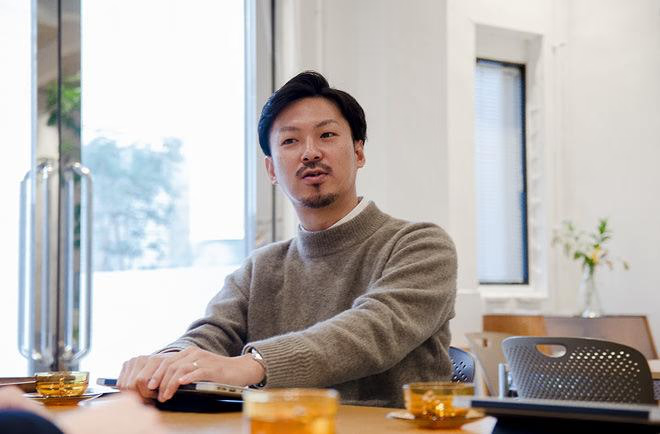
中村和貴さん(アートディレクター/デザイナー・取締役)
-
 松本さん
松本さん -
プロジェクトを進めてみてわかったのは、1ヶ月休んだことでその人の仕事が何か変わるほどの大きな変化は起きません。でも、次の月に出てこなくても、休みの間に得た何かは残っているから。それが糧となり、じわじわと発揮されるんだと思います。もちろん、単純にリフレッシュという意味ではすごく効果ありますけどね。
さっき畠山さんは、仕事が気になるから1ヶ月休みでも自分はインターンに行くといったじゃないですか。でも、大自然が苦手なシティボーイであるならば、なるべく真逆をすることによって、都会が好きな気持ちがより引き立つと思うんですよ。
仕事が好きであればあるほど、1ヶ月休みでは何もしちゃいけない。仕事じゃないことをする。やりたいと思うのは、依存しているってことですから。依存はプロフェッショナル的に時によくないから。
まったく離れて、とにかく何かやりたいけどやれないっていう状況での1ヶ月を過ごした後の次の月以降、畠山さんの仕事が爆発するわけですよ。水を得た魚のように。
-
 中村さん
中村さん -
俺にはこれしかない!
-
 松本さん
松本さん -
だから、無人島で1ヶ月とかいいんじゃないですか。『俺はこんなの嫌だ!』『俺は都会に帰りたいー』って言いながら溜めたパワーによって、都会の良さがさらに見えてくる。大事なものほどなくすと価値がわかりますから。
「個」を尊重し、会社に依存しない
次のプロジェクトでは新たなワークスタイルを追求する
取材中、驚いたのは松本さんが話題となっているプロジェクト「11ヶ月働いて1ヶ月休む会社」を、あっさりと「もうそろそろ終わりにしよう」と思っていることでした。
「ニュースにも取り上げられ、ワヴデザインに興味を持ってくれる人、働きたいと応募してくれる人も増えました。一方、働く側にどんな効果が出るのかもある程度見えてきた。それを展示の形で世の中にプレゼンテーションして一区切りにしたい」と。
そして、ワヴデザインさんでは新しいプロジェクトとして、より「働き方から、デザインする」という視点に近い試みが始まっていました。その根底にあるのは、「会社に依存しない」という考え方です。
-
 松本さん
松本さん -
まだ漠然とはしていますけど、会社が成長し結果を出してゆくには、個の力が重要で。そのために取り組み始めたのが、自分に最適な働き方を創造できるワークスタイルの確立です。
『会社で働く=会社に縛られる』ではなく、新しいワークスタイルをデザインしていきます。次なるステップですね。
-
 中村さん
中村さん -
具体的には、雇用形態を変えています。うちには今、会社員、プロジェクトごとの契約社員、フリーランスだけどワヴデザインにも席を持っている、という3つのスタイルの雇用形態があります。
-
 松本さん
松本さん -
細かく話すと、年間でやるような案件について契約したスタッフは会社に来ても来なくても仕事が滞らなければOKというスタイル。フリーランスは元々うちの社員から独立していった人たちで、彼らはうちの会社の名刺やアカウントを持っているけど、個人でもやっているという形です。
ヘンな話ですけど、僕は以前から『1つの会社に依存するのは、やめなさい』『給料も含めて収入は分散した方がいい』と言っていたんですね。社員の副業は前からOKですし、『最近、副業は何をやってるの?』『どのくらい収入があった?』『確定申告はどうするの?』という会話は日常的で、『そうやって収入があるのはいいよね』と勧めてきました。
-
 中村さん
中村さん -
会社じゃないところに収入源があることで、会社ともお互いが依存しない関係になれるよね。
-
 松本さん
松本さん -
依存しないっていうのはすごく大きい。副業はお金ももらえるけれど、会社がなくなったときのあなたの実力と魅力の現れでもあるから。そこで仕事がもらえないようでは、まだ魅力が足りないんじゃない? と。どんなスキルでも自分で考えて創意工夫を持って取り組めたら、お金を稼ぐことができるから。
-
 中村さん
中村さん -
副業の方が忙しくなってしまったスタッフに対して僕らができることは、こちらが条件的に優遇するか、お金を出すことで労働時間を確保させてもらうか、お金を出す以上の何かを提供するか。やりたくなるような仕事を作り出すといった交渉をするのが、自然な流れだと思います。
-
 松本さん
松本さん -
例えば、フリーランスの彼らがうちの社員スタッフに副業でコーディングの仕事を頼むなんてことも普通に起きています。
スタッフに『昼休みどうするの?』『フリーランスメンバーと昼飯食います。僕個人に頼みたい仕事の相談みたいです』『へえ、いいね』って、よくわからない状態(笑)。
結論ですけど、細かいことをいちいち咎めていたらしょうがなくて、仕事があるのは経済が大きくなって魅力のあることだから、すべて容認するという考え方です。細かいところで、会社に戻ってきて向こうの仕事をやっていても、それはご自由に、と。
止めてもしょうがないですし、仕事があればやりたいですし、それによってこっちの仕事がすごくおろそかになれば、もちろん言いますけど。あんまりそういうことはないですね。
-
 中村さん
中村さん -
うん。逆にしっかりやるようになっていくよね。
-
 松本さん
松本さん -
でも、働き方を自由にしていったら、よくわからないことになっているのは、たしかですね。価値観がさまざまで。ただ、うっすらとした帰属意識というか、コミュニティに所属している感覚はあった方がいいなと思うので、年に2回はみんなで集まってごはんを食べるってことはやっています。
そこで思うのは、みんなを囲い込もうとするのは不自然で、『楽しいから行く』というのが一番大事だと思う。ちなみにですけど、そういう感じにしたら、うちから出たフリーランスの彼らが個人では受けられない案件を『ワヴで受けてくれないか』と依頼してきて、いっしょにやっていくというパターンも出てきました。仕事って広がるものだな、って。
コミュニケーションの量とゆるやかなつながりが、
自由なスタイルでの働き方を支える
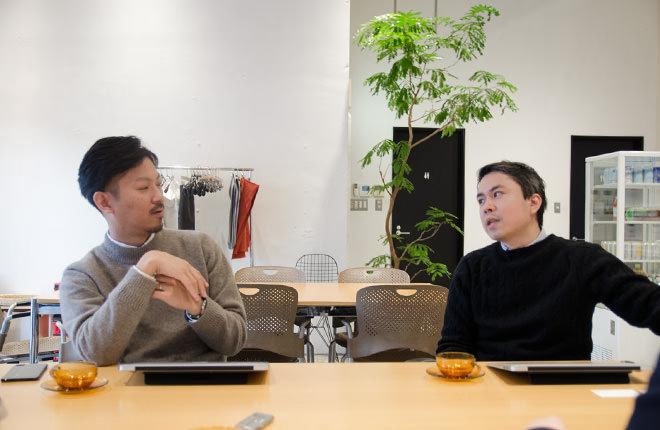
ここまでオープンに副業を認め、さまざまな形の働き方を受け入れている制作会社はめずらしいと思います。こんなふうに自由なスタイルを取ることができる理由を聞くと、こんな答えが返ってきました。
-
 松本さん
松本さん -
副業が禁止されていると聞くと、正直なところ『なんでダメなの?』と思ってしまう。
-
 中村さん
中村さん -
僕も同じ意見で、2人の価値観が揃っているから、特別新しいことをしている感覚はないんですよね。休日に、スタッフからプライベートの仕事の相談が来たりもしますし。
-
 松本さん
松本さん -
これもヘンな話で。
-
 中村さん
中村さん -
『ちょっとデザインを見てください』と。で、見てみてちょっと気になったら、自分で修正したヤツを送ってあげたりとかしています(笑)
-
 松本さん
松本さん -
僕らが社員にバイトを頼むこともありますし。月から金の勤務時間では頼めないけど、土曜日だったらお願いできそう。そこで、『バイト代出すからやってくれない?』と。会社とは別で、社員にバイトをしてもらうという謎なルート。経理にも言われますから、『なんで給料を出しているのに、バイト代も出ているんですか?』って。『こっちは会社員として払っていて、こっちは個人に払っているって感覚なんだけど』と答えています。土日は休みだから。
-
 中村さん
中村さん -
まとめると、個を尊重している、ということになるのかな。
-
 松本さん
松本さん -
それはあるよね。依存しないけど、個でいるさみしさもわかるから、ベースとなるプラットフォームやコミュニティは欲しいよね、という発想です。みんなで力を合わせてみたいな感じは、プロジェクトによってはもちろんありますけど、基本的には自分自身の力を付けるってことが一番大事。人はそれでしかがんばれないのかな? とも思っていて。その人が本当にやりたいか、やりたくないか。会社のため、みたいなのは、全然考えなくていいよって話はよくしている。目線が全部、個なんですよね。 副業がダメというのは、経営的な目線で考えるとわかります。でも、個で考えれば、会社で仕事をする以外に他でも仕事をしてお金が入ったらうれしいじゃないですか。だから、やればいいって考え。1ヶ月休みも『あなたはこれをやりたいの?』『やりたいです』『これをやって満足したんです』という手応えがあれば、直接仕事に還元されなくても『よかったね』という話です。
-
 中村さん
中村さん -
最近はスタッフがお客さんのところに常駐する形で案件にコミットし、月に1回会うか、会わないか。みたいな社員もいます。定時連絡も特にないです。
-
 松本さん
松本さん -
そういうスタンスなんですね。うちの会社。普通は朝礼とかあるじゃないですか。1回もやったことないですし、報告会とかもないですし。もちろん、何かあればみんなに必要なタイミングで報告はしますよ。
-
 中村さん
中村さん -
でも、その分、会ったときはよく話しますね。
-
 松本さん
松本さん -
あ、それはあるね。当たり前のこと過ぎて、そこを端折って話すからよくないんだな。たしかに、話します。よく話す。お客さんのところに行っているスタッフとも、会ったときには1時間、2時間と話します。この2人もディスカッション、すごくします。
-
 中村さん
中村さん -
知り合って10年以上経ちますけど、いまだに4時間くらい外で立ち話とかしていますから。
-
 松本さん
松本さん -
こんなアイデアがあるけど、やってみて何か意味があるのかな。おもしろいのかな。こういうプロジェクトがあったらどうだろう? と。僕がやりたいことを中村にぶつけて、プレゼンしていくような関係。 その上で、お互いがすごくしゃべっていますね。そうやって共有している価値観をアップデートしたり、刺激を受けて、変化していく。中村は、何かを始めるときは1人の人が独断でやるほうがいいって考えなんですよ。その方がより個性が出るからって。
-
 中村さん
中村さん -
そうです。僕は『総意』みたいなものをあまり信じていなくて。ゆるくなるじゃないですか。みんながみんな一個の料理を味付けしだすと、おいしくない料理になっていく気がしていて。それよりも個性があって、誰かの好みで、『これがうまいでしょう?』と出す料理の方が僕は好きなんですよ。そしてその料理が好きな人が集まる。
-
 松本さん
松本さん -
役割は明確に分かれていますね。
-
 中村さん
中村さん -
ワヴデザインは僕の頭のなかのイメージですけど、松本が三角形の先端で尖らせていって、僕は土台の裾野を広げていく。丸くなったら、また松本が尖らせてってことの繰り返しで、強固になっていっているのかなと思っています。 それと、これはこの10年くらいでわかったんですけど、僕はどうやら人の背中を押すのがすごく好きみたいで(笑)。『やりたいの? やればいいじゃん!』と言える瞬間を求めています。
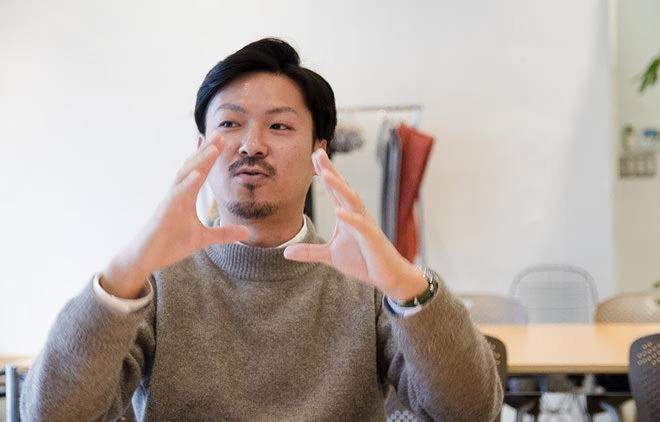
-
 松本さん
松本さん -
今、やってみたいと思っているのは受注案件をやりつつも、自分たちでコンテンツを作ること。オフィスを週末だけ開放して、マーケット的な感じで新しいコミュニティ作りをしたり、運営しているギャラリーで様々な企画を仕掛けたりしたいです。そんな話を中村やスタッフに話して、ワクワクする。1ヶ月休みにしても『やってみたい』と言ったのが僕で、背中を押して、仕組みを整えてくれたのが中村。振り返ると僕、尖らせることにしか興味がないんですね。今日、話していてよくわかった(笑)。
畠山の「ココが売りたい!」
今回のインタビューを終えて、ワヴデザインさんに感じていた魅力がさらに深まっていきました。私が特に強く宣伝したいのは、次の3つのポイントです。
- 個にこだわることで、他より圧倒的に品質の高い制作を行っていること
- 働き方から、デザインするためのプロジェクトに取り組んでいること
- 話していると、つい自分も一緒に働きたくなる松本&中村コンビの先輩感
最後に改めて、「11ヶ月働いて、1ヶ月休む会社」プロジェクトについて話を聞くなかで出てきた印象的なエピソードを紹介したいと思います。
「『1ヶ月休みだったら、何をする?』という問いは、働く人への大きな問いかけだと思うんです。大概の思いつくことって、その気になれば週末にできちゃうことじゃないですか。
例えば、本を読む、映画をいっぱい見る、お世話になった人に会う、ずっと行きたかった場所に行く……。でも、『1ヶ月休みなら? あなたは何をしますか?』と。制作をやっている人でも、やっていない人でも、どんなプランを叶えていくのか。そこに、その人の人間性や器が出るなと思っているんですね。すぐにアイデアが出ないと、『あれ、俺、こんなつまらない人間だったかな?』と、自分に驚くかもしれない。そして、問いかけている僕は、みんなのプランを聞いてワクワクしたいだけなんだと思います」
そう言っていたずらっぽく笑った松本さんに「時には仕事から離れろ」とアドバイスされた私は、取材の後、一歩立ち止まって自分の働き方について考える時間を持てました。
だから、最後に質問です。
「あなたは、1ヶ月休みなら何をしますか?」
〜オフィス探訪〜
ワヴデザインさんのクリエイティブを生み出す
富ヶ谷3つのオフィス
ワヴデザインさんは渋谷区富ヶ谷周辺に3つのオフィスを構えています。
アパレルショップが入っていそうな開放感あふれるオフィスや、ギャラリースペース、SOHOの方がいるオフィスなど、さまざまな用途に使われる可能性を秘めた空間をお持ちです。
オフィス+αの何かが生まれそうなワヴデザインさんのオフィスを、少しだけ紹介します。
Wab Design INC. STUDIO
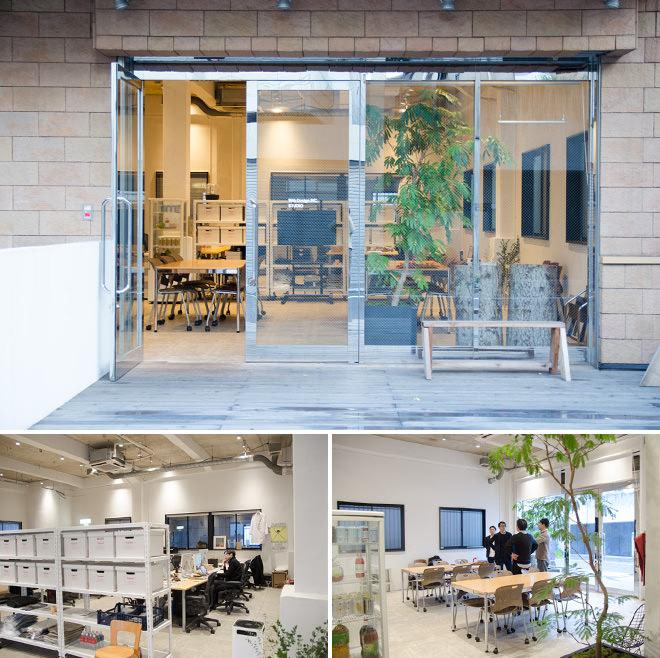
白を基調としたSTUDIO兼オフィス。敷居がなくコミュニケーションが取りやすい落ち着いた雰囲気。
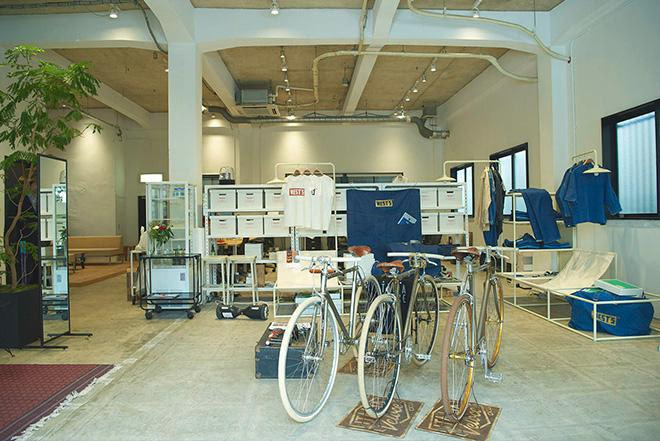
2016年には 新たなアパレルブランドの合同展示会 PARKS GROUP EXHIBITION の展示もこちらのオフィスで行われた。
WDI Gallery
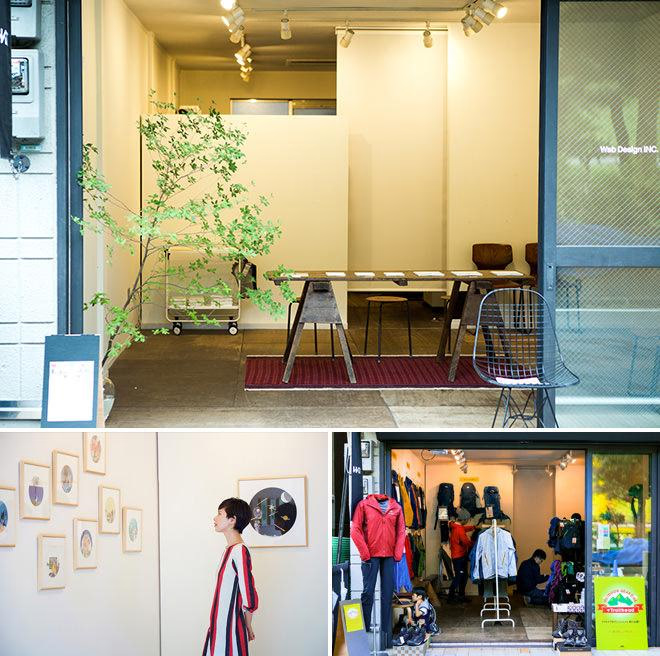
ワヴデザインさんの<今>を発信しているギャラリーとして使われているスペースオフィス。アート展示やアパレルブランドの合同展、インディペンデントマガジンの展示など、使われ方も多様。(詳しくはWDI Galleryサイトへ)路面店のようにオープンになっているため、通りかかる人の目を引く独特の外観。
WDI SOHOスペース
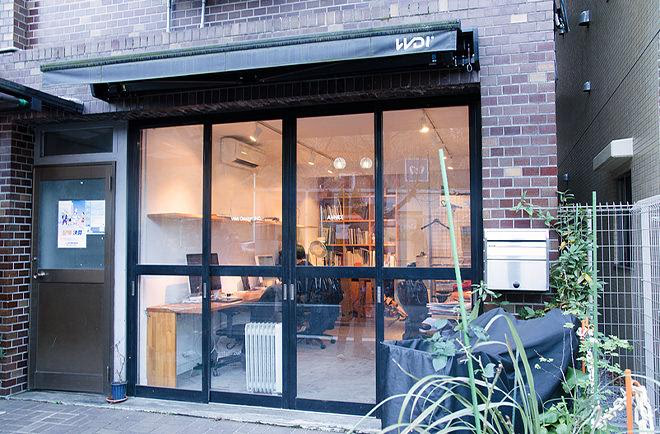
フリーランスのメンバー用のSOHOスペース。
ワヴデザイン株式会社 / Wab Design INC.
HEAD OFFICE
東京都渋谷区富ヶ谷1-8-5 後藤ビル1F
ANNEX
東京都渋谷区富ヶ谷1-8-7 司ビル1F
STUDIO
東京都渋谷区代々木5-38-8 今井ビル1F
お問い合わせ窓口
tel 03.3466.2695 / fax 03.3466.2696 / mail info@wab.cc
コーポレートサイト
http://www.wab.cc
